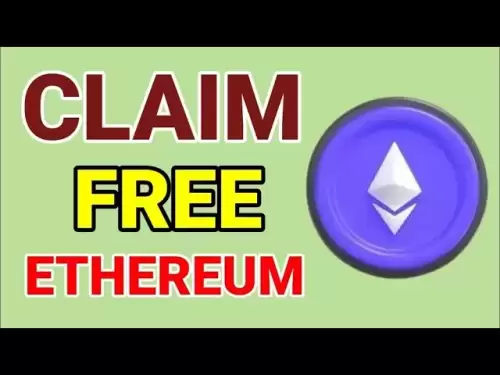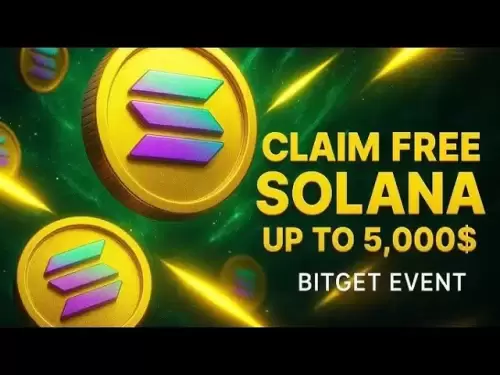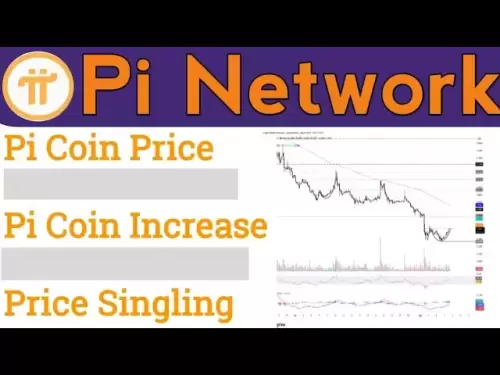-
 Bitcoin
Bitcoin $116900
0.00% -
 Ethereum
Ethereum $4280
5.48% -
 XRP
XRP $3.265
-1.45% -
 Tether USDt
Tether USDt $1.000
-0.01% -
 BNB
BNB $807.0
1.41% -
 Solana
Solana $183.1
2.93% -
 USDC
USDC $0.9999
0.00% -
 Dogecoin
Dogecoin $0.2440
6.50% -
 TRON
TRON $0.3357
-0.88% -
 Cardano
Cardano $0.8178
2.63% -
 Hyperliquid
Hyperliquid $44.13
7.45% -
 Chainlink
Chainlink $21.39
9.09% -
 Stellar
Stellar $0.4524
-0.84% -
 Sui
Sui $3.957
2.13% -
 Bitcoin Cash
Bitcoin Cash $572.7
-2.54% -
 Hedera
Hedera $0.2671
1.54% -
 Avalanche
Avalanche $24.77
4.17% -
 Ethena USDe
Ethena USDe $1.001
0.02% -
 Litecoin
Litecoin $122.3
-1.94% -
 Toncoin
Toncoin $3.432
2.26% -
 UNUS SED LEO
UNUS SED LEO $9.007
0.49% -
 Shiba Inu
Shiba Inu $0.00001396
5.26% -
 Uniswap
Uniswap $11.09
1.64% -
 Polkadot
Polkadot $4.155
4.57% -
 Dai
Dai $1.000
0.00% -
 Pepe
Pepe $0.00001253
5.11% -
 Cronos
Cronos $0.1588
2.67% -
 Bitget Token
Bitget Token $4.512
0.05% -
 Monero
Monero $275.0
0.64% -
 Ethena
Ethena $0.7527
15.10%
Is Ethereum worth investing in? The potential and risks of smart contract platforms
Ethereum's smart contracts enable trustless transactions, but investing involves risks like market volatility, scalability issues, and regulatory uncertainties.
May 28, 2025 at 12:21 am
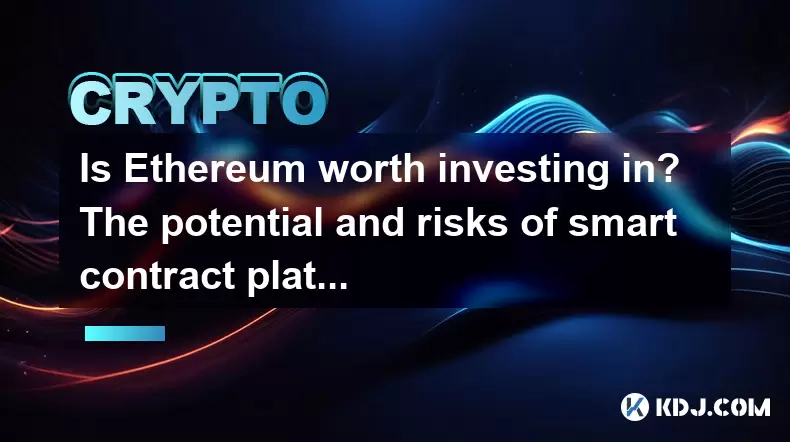
Is Ethereum worth investing in? The potential and risks of smart contract platforms
Ethereum, launched in 2015, has grown to become one of the most prominent blockchain platforms, largely due to its pioneering work in smart contract technology. Smart contracts are self-executing contracts with the terms of the agreement directly written into code, allowing for trustless and automatic transactions. This article explores the potential and risks associated with investing in Ethereum, a leading smart contract platform.
The Potential of Ethereum as a Smart Contract Platform
Ethereum's potential stems from its ability to facilitate the creation and deployment of decentralized applications (DApps). These applications leverage Ethereum's blockchain to run autonomously, securely, and without any downtime. The platform's native cryptocurrency, Ether (ETH), is used to pay for transaction fees and computational services. The versatility of Ethereum has led to its adoption in various sectors, including finance, gaming, and supply chain management.
One of the most significant developments on Ethereum is the rise of decentralized finance (DeFi). DeFi platforms use smart contracts to offer financial services such as lending, borrowing, and trading without traditional intermediaries. This has led to a surge in the use of Ethereum, as users seek to take advantage of these new financial tools. The growth of DeFi underscores Ethereum's potential to revolutionize the financial industry.
Moreover, Ethereum's ecosystem is supported by a vibrant community of developers and users. The Ethereum Improvement Proposal (EIP) process allows for continuous upgrades and enhancements to the platform. This community-driven development model ensures that Ethereum remains at the forefront of blockchain technology.
The Risks of Investing in Ethereum
Despite its potential, investing in Ethereum carries several risks. One of the primary concerns is the volatility of cryptocurrency markets. The price of Ether can fluctuate dramatically, leading to significant gains or losses for investors. This volatility is driven by factors such as market sentiment, regulatory news, and technological developments.
Another risk is the scalability issues faced by Ethereum. As the platform's popularity has grown, so too has the number of transactions it needs to process. This has led to network congestion and high transaction fees, which can deter users and affect the platform's usability. Efforts to address these issues, such as the transition to Ethereum 2.0, are ongoing but not yet complete.
Security is also a major concern. Smart contracts, while innovative, are not immune to bugs and vulnerabilities. High-profile hacks, such as the DAO hack in 2016, have highlighted the potential for significant losses due to coding errors. Investors must be aware of the risks associated with smart contract security and the importance of thorough auditing and testing.
Ethereum 2.0 and its Impact on Investment Decisions
Ethereum 2.0, also known as Eth2, represents a significant upgrade to the Ethereum network. The transition from a proof-of-work (PoW) to a proof-of-stake (PoS) consensus mechanism is designed to improve the platform's scalability, security, and energy efficiency. The implementation of Eth2 is expected to address many of the current limitations of Ethereum, such as high transaction fees and slow processing times.
The move to PoS will also introduce staking, allowing ETH holders to earn rewards by participating in the validation of transactions. This could potentially increase the attractiveness of Ethereum as an investment, as it offers an additional revenue stream for holders. However, the transition to Eth2 is a complex process that will take several years to complete, and there are uncertainties about its successful implementation.
Regulatory Considerations
Regulatory uncertainty is another factor that investors must consider when evaluating Ethereum. Cryptocurrencies and blockchain technology are subject to evolving regulations, which can impact their use and adoption. Governments around the world are still determining how to classify and regulate cryptocurrencies, and this can lead to sudden changes in market conditions.
In some jurisdictions, smart contracts and DeFi platforms may face increased scrutiny and potential restrictions. For example, regulatory bodies may impose requirements for Know Your Customer (KYC) and Anti-Money Laundering (AML) compliance, which could affect the decentralized nature of these platforms. Investors need to stay informed about regulatory developments and how they might impact Ethereum's future.
Competition from Other Smart Contract Platforms
Ethereum is not the only smart contract platform in the market. Competitors such as Binance Smart Chain, Solana, and Cardano offer similar functionalities and are vying for market share. These platforms often promise improvements in areas where Ethereum struggles, such as scalability and transaction costs.
The presence of these competitors can influence Ethereum's market position and attractiveness as an investment. Investors must consider the strengths and weaknesses of each platform and how they might affect Ethereum's long-term viability. The competitive landscape of smart contract platforms is dynamic, and staying informed about developments in this space is crucial for making informed investment decisions.
Evaluating Ethereum's Investment Potential
When considering whether to invest in Ethereum, it is important to conduct a thorough analysis of its potential and risks. Investors should assess their risk tolerance and investment goals before committing to any cryptocurrency. Diversification is also a key strategy to mitigate the risks associated with volatile assets like Ether.
Additionally, staying up-to-date with developments in the Ethereum ecosystem is essential. This includes monitoring the progress of Ethereum 2.0, regulatory changes, and the growth of DeFi and other applications built on the platform. Engaging with the Ethereum community can provide valuable insights and help investors make more informed decisions.
Frequently Asked Questions
Q: How does Ethereum's smart contract functionality compare to other blockchain platforms?
A: Ethereum was the first blockchain platform to introduce smart contracts at scale, making it a pioneer in this field. While other platforms like Binance Smart Chain and Solana also support smart contracts, Ethereum's established ecosystem and extensive developer community give it a significant advantage. However, these competitors are often faster and cheaper to use, which can be attractive for certain applications.
Q: What role does the Ethereum Foundation play in the development of the platform?
A: The Ethereum Foundation is a non-profit organization that supports the development of Ethereum. It funds research and development projects, organizes community events, and helps coordinate upgrades to the network. The foundation plays a crucial role in ensuring the continued growth and improvement of the Ethereum ecosystem.
Q: Can I use Ethereum for everyday transactions?
A: While Ethereum can be used for everyday transactions, its high transaction fees and slower processing times compared to traditional payment systems make it less practical for this purpose. However, with the improvements expected from Ethereum 2.0, it may become more viable for daily use in the future.
Q: How do I start investing in Ethereum?
A: To start investing in Ethereum, follow these steps:
- Choose a reputable cryptocurrency exchange: Platforms like Coinbase, Binance, and Kraken are popular choices.
- Create an account: Complete the registration process, which may include KYC verification.
- Deposit funds: Use a bank transfer, credit card, or other supported payment methods to add money to your account.
- Buy Ethereum: Navigate to the trading section and purchase ETH using your deposited funds.
- Secure your investment: Transfer your ETH to a secure wallet, such as a hardware wallet like Ledger or Trezor, to protect your assets.
Remember to conduct thorough research and consider your investment strategy before making any decisions.
Disclaimer:info@kdj.com
The information provided is not trading advice. kdj.com does not assume any responsibility for any investments made based on the information provided in this article. Cryptocurrencies are highly volatile and it is highly recommended that you invest with caution after thorough research!
If you believe that the content used on this website infringes your copyright, please contact us immediately (info@kdj.com) and we will delete it promptly.
- XRP Price, Remittix, and Ripple Rivals: A Crypto Cocktail
- 2025-08-10 10:50:16
- Live Crypto Updates, August 10: ETH Soars, Trump's Crypto Play, and More!
- 2025-08-10 11:30:16
- Riding the Wave: Ethereum, DeFi, and the Liquid Staking Derivatives (LSDs) Surge
- 2025-08-10 10:30:15
- Strobe Ventures, ENA Tokens, and the Surge: What's the Deal?
- 2025-08-10 10:35:15
- Shiba Inu, Pepe, and Remittix: A Tale of Memes, Hype, and Real-World Utility
- 2025-08-10 08:30:12
- Ethereum Price, ETH Tokens, Rally Prediction: Is a New All-Time High In Sight?
- 2025-08-10 08:30:12
Related knowledge

How to purchase Aragon (ANT)?
Aug 09,2025 at 11:56pm
Understanding Aragon (ANT) and Its PurposeAragon (ANT) is a decentralized governance token that powers the Aragon Network, a platform built on the Eth...

Where can I buy UMA (UMA)?
Aug 07,2025 at 06:42pm
Understanding UMA and Its Role in Decentralized FinanceUMA (Universal Market Access) is an Ethereum-based decentralized finance (DeFi) protocol design...

How to buy Storj (STORJ) tokens?
Aug 09,2025 at 07:28am
Understanding Storj (STORJ) and Its Role in Decentralized StorageStorj is a decentralized cloud storage platform that leverages blockchain technology ...

What is the best app to buy Nano (NANO)?
Aug 09,2025 at 03:35am
Understanding Nano (NANO) and Its Unique FeaturesNano is a feeless, instant cryptocurrency designed for fast peer-to-peer transactions. Unlike many ot...

Where can I purchase Siacoin (SC)?
Aug 08,2025 at 11:14am
Understanding Siacoin (SC) and Its Role in the Sia NetworkSiacoin (SC) is the native cryptocurrency of the Sia decentralized cloud storage platform, a...
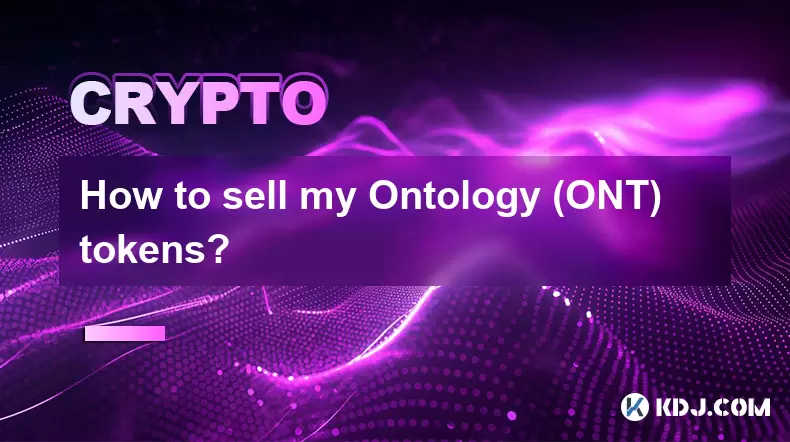
How to sell my Ontology (ONT) tokens?
Aug 09,2025 at 06:08pm
Understanding Ontology (ONT) and Its Trading EcosystemBefore selling your Ontology (ONT) tokens, it's essential to understand the nature of the crypto...

How to purchase Aragon (ANT)?
Aug 09,2025 at 11:56pm
Understanding Aragon (ANT) and Its PurposeAragon (ANT) is a decentralized governance token that powers the Aragon Network, a platform built on the Eth...

Where can I buy UMA (UMA)?
Aug 07,2025 at 06:42pm
Understanding UMA and Its Role in Decentralized FinanceUMA (Universal Market Access) is an Ethereum-based decentralized finance (DeFi) protocol design...

How to buy Storj (STORJ) tokens?
Aug 09,2025 at 07:28am
Understanding Storj (STORJ) and Its Role in Decentralized StorageStorj is a decentralized cloud storage platform that leverages blockchain technology ...

What is the best app to buy Nano (NANO)?
Aug 09,2025 at 03:35am
Understanding Nano (NANO) and Its Unique FeaturesNano is a feeless, instant cryptocurrency designed for fast peer-to-peer transactions. Unlike many ot...

Where can I purchase Siacoin (SC)?
Aug 08,2025 at 11:14am
Understanding Siacoin (SC) and Its Role in the Sia NetworkSiacoin (SC) is the native cryptocurrency of the Sia decentralized cloud storage platform, a...

How to sell my Ontology (ONT) tokens?
Aug 09,2025 at 06:08pm
Understanding Ontology (ONT) and Its Trading EcosystemBefore selling your Ontology (ONT) tokens, it's essential to understand the nature of the crypto...
See all articles





















